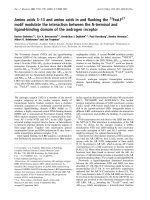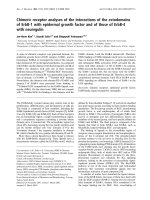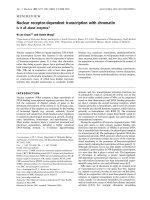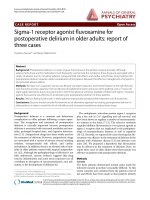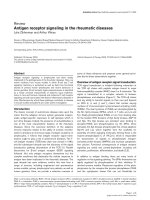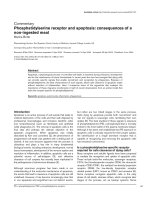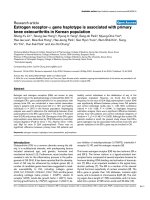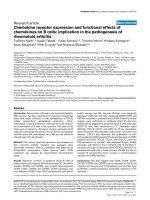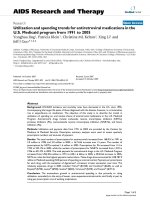Báo cáo y học: "Sigma-1 receptor agonist fluvoxamine for postoperative delirium in older adults: report of three cases" docx
Bạn đang xem bản rút gọn của tài liệu. Xem và tải ngay bản đầy đủ của tài liệu tại đây (320.32 KB, 3 trang )
Furuse and Hashimoto Annals of General Psychiatry 2010, 9:28
/>Open Access
CASE REPORT
© 2010 Furuse and Hashimoto; licensee BioMed Central Ltd. This is an Open Access article distributed under the terms of the Creative
Commons Attribution License ( which permits unrestricted use, distribution, and repro-
duction in any medium, provided the original work is properly cited.
Case report
Sigma-1 receptor agonist fluvoxamine for
postoperative delirium in older adults: report of
three cases
Tsutomu Furuse*
1
and Kenji Hashimoto
2
Abstract
Background: Postoperative delirium is a topic of great importance in the geriatric surgical specialty. Although
antipsychotic drugs are the medications most frequently used to treat this syndrome, these drugs are associated with a
variety of adverse events, including sedation, extrapyramidal side effects, and cardiac arrhythmias. Drug treatment for
postoperative delirium requires careful consideration of the balance between the effective management of symptoms
and potential adverse effects.
Methods: We report on a Japanese woman (an 86-year-old (open reduction and internal fixation of the right femoral
neck fracture), and two Japanese men (an 86-year-old (abdominal aortic aneurysm stent grafting), and a 77-year-old
(right upper lobectomy due to lung tumour)) in which the selective serotonin reuptake inhibitor and sigma-1 receptor
agonist fluvoxamine was effective in ameliorating the postoperative delirium of these patients.
Results: Delirium Rating Scale scores in these patients dramatically decreased after treatment with fluvoxamine.
Conclusions: Doctors should consider fluvoxamine as an alternative approach to treating postoperative delirium in
older patients in order to avoid the risk of side effects and increased mortality by antipsychotic drugs.
Background
Postoperative delirium is a common and deleterious
complication in older patients following a major opera-
tion. The recognition and treatment of postoperative
delirium is critically important because postoperative
delirium is associated with increased morbidity and mor-
tality, prolonged hospital stays, and cognitive deteriora-
tion [1-3]. Antipsychotic drugs have been widely used for
the treatment of delirium. However, antipsychotic drugs
are associated with a variety of adverse events including
sedation, extrapyramidal side effects, and cardiac
arrhythmias. In addition, there is an elevated risk of mor-
tality in older patients treated with atypical antipsychot-
ics [4,5]. Although the pathophysiology of delirium is not
fully understood, current evidence suggests that drug
toxicity, inflammation and acute stress responses can all
contribute to disruption of neurotransmission, and, ulti-
mately, to the development of delirium [6].
The endoplasmic reticulum protein sigma-1 receptors
play a key role in Ca
2+
signalling and cell survival, and
have been shown to regulate a number of neurotransmit-
ter systems in the brain [7-12]. The selective serotonin
reuptake inhibitor fluvoxamine is a very potent agonist at
sigma-1 receptors that are implicated in the pathophysi-
ology of neuropsychiatric diseases as well as cognition
[10-12]. Recently, we reported the cases showing that flu-
voxamine was effective in the treatment of delirium in the
patients with Alzheimer disease [13] and intensive care
units [14]. We proposed a hypothesis that fluvoxamine
may be effective in the treatment of delirium. Here, we
report three cases in older adults where fluvoxamine was
effective in patients with postoperative delirium.
Methods
Consent
The three patients deteriorated mental status made the
informed consent procedure reasonably difficult. To this
extent consents were obtained from the patient's next of
kin and efforts have been made so that patient's identity
* Correspondence:
1
Department of Psychiatry, Asahikawa Red Cross Hospital, Asahikawa, Japan
Full list of author information is available at the end of the article
Furuse and Hashimoto Annals of General Psychiatry 2010, 9:28
/>Page 2 of 3
remains anonymous and there is no reason to think that
the patients or their family would object to publication.
Results
Case reports
Case 1
An 86-year-old Japanese woman was admitted to a hospi-
tal emergency room after falling at a health and mental
centre for older patients. The patient was diagnosed with
a right femoral neck fracture on X-ray examination, and
she received emergency open reduction and fixation. She
became overly excited while waking from anaesthesia,
and was referred to the hospital's department of psychia-
try. She was disoriented and agitated. To treat her postop-
erative delirium, she was administered fluvoxamine (50
mg, twice a day) and flunitrazepam (1 mg, at night). The
next day she did not remember that she had received an
operation, and she was unhappy with the cast on her leg.
Therefore, the fluvoxamine was increased to 100 mg
(twice a day), since there were no gastrointestinal side
effects. At 2 days after the first treatment, fluvoxamine
was increased to 150 mg (twice a day). Her sleep distur-
bance improved, and her Delirium Rating Scale (DRS)
[15] score decreased dramatically, from 27/32 to 13/32.
After recovery, her Mini-Mental State Examination
(MMSE) [16] score was 8/32.
Case 2
An 86-year-old Japanese man had been admitted to a
health and mental centre for older patients for 2 years.
The patient was diagnosed with abdominal aortic aneu-
rysm, and was a candidate for surgery. He underwent the
operation using a custom-made stent graft for abdominal
aortic aneurysm. After his operation, he had insomnia
and was in a seditious state. Therefore, he was referred to
the hospital's department of psychiatry. He was disori-
ented and agitated, and was diagnosed with postoperative
delirium. To treat this, he was administered fluvoxamine
(50 mg, twice a day) and lorazepam (0.5 mg, at night).
The day after the first treatment, his sleep disturbance
improved, and his DRS score decreased dramatically,
from 19/32 to 8/32. After recovery, his MMSE score was
10/30.
Case 3
A 77-year-old Japanese man was diagnosed with right
upper lobectomy due to a right lung apex tumour, and
underwent surgery to remove the tumour. His cardio-
respiratory dynamic state was stable, but he became
excited after the tracheal extubation. Therefore, he was
referred to the hospital's department of psychiatry. He
was disoriented and agitated, and was diagnosed with
postoperative delirium. To treat his postoperative delir-
ium, he was administered fluvoxamine (50 mg, twice a
day) and flunitrazepam (1 mg, at night). The next day flu-
voxamine was increased to 100 mg (twice a day), since
there were no gastrointestinal side effects. At 2 days after
the first treatment, his DRS score decreased dramatically,
from 20/32 to 10/32. After recovery, his MMSE score was
9/30.
Discussion
To our knowledge, this case report is the first to demon-
strate that fluvoxamine is rapidly effective for treating
postoperative delirium in older patients. Nonetheless, a
randomised double-blind, placebo-controlled study of
fluvoxamine will be needed to confirm its efficacy for the
treatment of postoperative delirium in patients. Recent
findings suggest that sigma-1 receptors might be involved
in the different mechanisms of some selective serotonin
reuptake inhibitors (SSRIs), and that fluvoxamine is a
potent sigma-1 receptor agonist [10-12]. Currently, it is
unclear whether sigma-1 receptors were involved in the
mechanism underlying the beneficial effects of fluvoxam-
ine against the postoperative delirium of these patients.
In order to confirm the role of sigma-1 receptors in the
treatment of postoperative delirium, a randomised dou-
ble-blind, placebo-controlled study of selective sigma-1
receptor agonists (for example, cutamesine (SA4503)) in
patients with postoperative delirium would also be of
interest.
In all the patients reported on here, low doses of fluni-
trazepam or lorazepam were used for the treatment of
insomnia since these drugs are considered to be the most
effective benzodiazepine hypnotics. Therefore, we cannot
exclude a possible contribution of these hypnotics on the
efficacy of fluvoxamine for delirium. A further study of
fluvoxamine alone will be necessary.
Delirium is theorised to be a neurobehavioural mani-
festation of imbalances in the synthesis, release, and inac-
tivation of a number of neurotransmitters that normally
control cognitive function, behaviour, and mood [6].
Given the role of sigma-1 receptors in the regulation of a
number of neurotransmitters as well as in cognition [7-
12], it is likely that sigma-1 receptor agonist may be
involved in the fluvoxamine's mechanisms of action,
although a further study will be necessary.
Drug treatment for postoperative delirium requires
careful consideration of the balance between the effective
management of symptoms and potential adverse effects.
As mentioned above, there is an elevated risk of mortality
in older patients treated with atypical antipsychotics
[4,5], suggesting that the widespread use of atypical
antipsychotic drugs in older adults should be re-evalu-
ated. Therefore, the sigma-1 receptor agonist fluvoxam-
ine may serve as an alternative treatment option for older
adults with postoperative delirium, although further
detailed studies on the role of sigma-1 receptors in post-
operative delirium are necessary.
Furuse and Hashimoto Annals of General Psychiatry 2010, 9:28
/>Page 3 of 3
Conclusions
This case report suggests that fluvoxamine could be an
alternative approach to treating postoperative delirium in
older adults because of the risk of extrapyramidal side
effects and increased mortality by antipsychotic drugs.
Competing interests
The authors declare that they have no competing interests.
Authors' contributions
TF contributed to the clinical and rating evaluations during the follow-up peri-
ods. KH conceived of the study and participated in its study and coordination.
Both authors read and approved the final manuscript.
Author Details
1
Department of Psychiatry, Asahikawa Red Cross Hospital, Asahikawa, Japan
and
2
Division of Clinical Neuroscience, Chiba University Center for Forensic
Mental Health, Chiba, Japan
References
1. Fricchione GL, Nejad SH, Esses JA, Cummings TJ, Querques J, Cassem NH,
Murray GB: Postoperative delirium. Am J Psychiatry 2008, 165:803-812.
2. Sieber FE: Postoperative delirium in the elderly surgical patient.
Anesthesiol Clin 2009, 27:451-464.
3. Deiner S, Silverstein JH: Postoperative delirium and cognitive
dysfunction. Br J Anaesth 2009, 103(Suppl 1):41-46.
4. Wang PS, Schneeweiss S, Avorn J, Fischer MA, Mogun H, Solomon DH,
Brookhart MA: Risk of death in elderly users of conventional vs. atypical
antipsychotic medications. N Engl J Med 2005, 353:2335-2341.
5. Schneider LS, Dagernab KS, Insel P: Risk of death with atypical
antipsychotic drug treatment for dementia. Meta-analysis of
randomized placebo-controlled trials. JAMA 2005, 294:1934-1943.
6. Fong TG, Tulebaev SR, Inouye SK: Delirium in elderly adults: diagnosis,
prevention and treatment. Nature Rev Neurol 2009, 5:210-220.
7. Hashimoto K, Ishiwata K: Sigma receptor ligands: possible application as
therapeutic drugs and as radiopharmaceuticals. Curr Pharm Des 2006,
12:3857-3876.
8. Hayashi T, Su TP: Sigma-1 receptor chaperones at the ER-
mitochondrion interface regulate Ca
2+
signaling and cell survival. Cell
2007, 131:596-610.
9. Hayashi T, Stahl SM: The sigma-1 receptor and its role in the treatment
of mood disorders. Drugs Future 2009, 34:137-146.
10. Hashimoto K: Sigma-1 receptors and selective serotonin reuptake
inhibitors: clinical implications of their relationship. Cent Nerv Sys
Agents Med Chem 2009, 9:197-204.
11. Ishikawa M, Hashimoto K: The role of sigma-1 receptors in the
pathophysiology of neuropsychiatric diseases. J Receptor Ligand
Channel Res 2010, 3:25-36.
12. Hindmarch I, Hashimoto K: Cognition and depression: the effects of
fluvoxamine, a sigma-1 receptor agonist, reconsidered. Human
Psychopharmacol Clin Exp 2010, 25:193-200.
13. Furuse T, Hashimoto K: Sigma-1 receptor agonist fluvoxamine for
delirium in patients with Alzheimer's disease. Ann Gen Psychiatry 2010,
9:6.
14. Furuse T, Hashimoto K: Sigma-1 receptor agonist fluvoxamine for
delirium in intensive care units: report of five cases. Ann Gen Psychiatry
2010, 9:18.
15. Trzepacz PT, Baker RW, Greenhouse J: A symptom rating scale for
delirium. Psychiatry Res 1988, 23:89-97.
16. Cockrell JR, Folstein MF: Mini-Mental State Examination (MMSE).
Psychopharmacol Bull 1988, 24:689-692.
doi: 10.1186/1744-859X-9-28
Cite this article as: Furuse and Hashimoto, Sigma-1 receptor agonist fluvox-
amine for postoperative delirium in older adults: report of three cases Annals
of General Psychiatry 2010, 9:28
Received: 14 May 2010 Accepted: 24 June 2010
Published: 24 June 2010
This article is available from: 2010 Furuse and Hashimoto; licensee BioMed Central Ltd. This is an Open Access article distributed under the terms of the Creative Commons Attribution License ( ), which permits unrestricted use, distribution, and reproduction in any medium, provided the original work is properly cited.Annals of General Psychiatry 2010, 9:28
